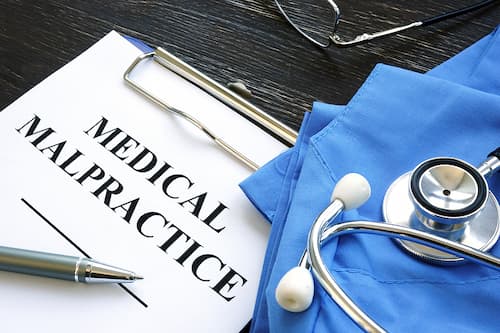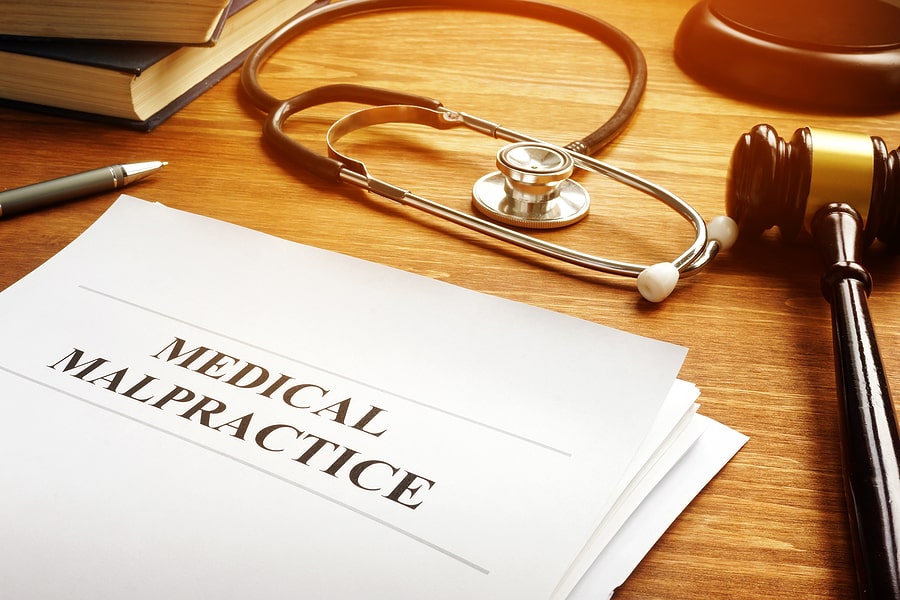Illinois has more than 200 hospitals and hundreds of clinics, standalone emergency departments, and private physician offices. While these medical facilities provide convenience and choice for residents and visitors, they can make mistakes, and when they do, you may hold them liable for injuries.
Not all bad outcomes in the medical arena result from an error, and not all errors can give rise to medical malpractice claims. Suppose a medical error injured you. In that case, a Chicago med mal lawyer could help you determine if your claim meets the criteria for medical malpractice and inform you of the services their legal team can provide in this complex type of case.
Can You Sue Your Doctor For Negligence?

In Illinois, individuals who were injured by a medical error caused by carelessness or recklessness can seek compensation for their expenses through a claim against the provider’s medical malpractice insurance policy
The following errors or omissions can warrant a medical malpractice claim:
- Diagnosis errors
- Surgical errors
- Birth injuries
- Medication errors
- Failure to obtain a complete medical history that could help the provider diagnose or treat a medical condition
Need Legal Help? Contact Our Experienced Team.
About Medical Malpractice in Illinois

According to a study conducted by Johns Hopkins Medicine, about 250,000 people die each year due to medical errors, with medical errors causing about 10 percent of all U.S. deaths.
When researchers published the study, they cautioned that many reported errors did not result from bad doctors but rather from systemic issues within the healthcare industry, including poor care coordination, fragmented insurance networks, the absence of or underused safety protocols, and variations in physician practice patterns.
Medical malpractice occurs when a hospital, doctor, or other health care professional causes an injury to a patient due to a negligent act or omission. According to the American Medical Association, about a quarter of adverse events occurring in the provision of health care are the result of negligence
The following errors or omissions can give rise to a medical malpractice claim in Illinois.
- Diagnosis errors, including failure to diagnose, delayed diagnosis, and misdiagnosis
- Surgical errors, including anesthesia errors, wrong-site surgery, wrong-patient surgery, or leaving a surgical tool or towel in the body cavity
- Birth injuries, such as failure to perform a medically indicated C-section, failure to diagnose a condition affecting the mother or child that could result in complications with delivery, or failure to monitor the infant’s vitals during labor or delivery and in the hours that follow.
- Medication errors, such as providing the wrong prescription or the wrong dosage to the patient
- Failure to obtain a complete medical history that could help the provider diagnose or treat a medical condition—informed consent means the patient has been appraised of the known risks of the procedure and has given their consent to it.
You Can Sue the Doctor If…
As noted, not every adverse medical outcome is the result of negligence. And medical malpractice lawsuits cannot remedy every negligent act by a healthcare provider.
You could file a medical malpractice claim against your doctor if the following elements are true in your case.
- The error that occurred resulted in your injury. You cannot sue a doctor for making an error. However, you can sue a doctor for making medical errors that injured you in many cases.
- Your injury resulted from medical negligence and was not simply a known risk.
- You are within the statute of limitations for filing a medical malpractice case. In Illinois, the statute of limitations on a medical malpractice claim is two years from the date the event leading to your injury occurred or two years from the date you discovered that you were injured. Illinois also has a “statute of repose” of four years on medical malpractice claims. You cannot seek compensation for your injury if more than four years passed since your injury, regardless of when you discovered the injury.
- Your attorney has obtained a required affidavit of merit when filing your claim in court. This affidavit states that your attorney has reviewed the details of your claim with a healthcare professional who works or teaches in the same medical practice area as the subject of your claim. The affidavit states that after this consultation, the consulted healthcare professional determined that there was a reasonable and meritorious cause to file the claim.
Seeking Compensation Through a Medical Malpractice Lawsuit in Illinois
The total payouts on medical malpractice claims in Illinois are more than $200 million a year and are among the highest in the nation. While the state does not explicitly require healthcare providers to have medical malpractice insurance, most medical facilities require doctors to have medical malpractice insurance to admit privileges to practice medicine in that facility.
Previously, the state had placed caps on the amount of non-economic (pain and suffering) damages received through medical malpractice claims, limiting those damages to $500,000 in claims against doctors and $1 million in claims against hospitals. However, the Supreme Court declared these damage caps unconstitutional in 2010 and struck down this arbitrary limit on compensation for medical malpractice claimants.
According to Illinois medical malpractice laws, individuals who were injured by a medical error caused by carelessness or recklessness can seek compensation for their expenses through a claim against the provider’s medical malpractice insurance policy.
If the insurer refuses to pay the claim or offer a fair settlement, you may file a medical malpractice lawsuit. You must file the medical malpractice case within two years of your injury. However, if you did not know for a time that you sustained an injury from a medical error, the statute of limitations can extend to account for the delay.
Unless the claimant was a child, you must file a lawsuit no longer than four years after the injury, regardless of when you discovered it.
#1. Why Would Someone Not Immediately Know That They Were Injured?
If the claimant did not immediately know they were injured, they get additional time to file a medical malpractice claim. While many injuries are immediately apparent, others can take time to discover.
For example, when health care providers leave surgical tools or instruments inside the body cavity. While this is not something that happens constantly, it is a relatively well-known type of medical negligence.
Surgical sponges are the most common instrument left in the body cavity, and they tend to soak up blood and blend with the surrounding tissues. Surgeons can carelessly overlook them before they close up the patient.
Unfortunately, because the patient’s surgery has concluded and there is no way to easily see where the surgeon left the tool, they might not discover the injury unless it caused immediate problems. Otherwise, it would remain where it was left, slowly damaging the organ and resulting in symptoms that can take a while to figure out.
#2. Medical Malpractice Claims Involving Children
As with most states in the nation, children under 18 in Illinois cannot file lawsuits independently but are instead reliant on a parent or legal guardian to file the claim. Illinois medical malpractice statute of limitations allows up to eight years to file a medical malpractice lawsuit on behalf of the child. You must file any medical malpractice lawsuits that seek compensation for expenses and impacts of an injury to a child before the child’s 22nd birthday.
#3. Affidavit of Merit
In Illinois, medical malpractice claimants wishing to file their claim in court must provide an affidavit of merit. This is a document signed by your attorney that states that they have reviewed your case with a healthcare professional or medical expert who teaches or practices the same area of medicine as the subject of your claim.
The affidavit also states that following this consultation—which can include reviewing medical records and other information about the error that occurred—the healthcare professional believes that the claim is reasonable and has merit.
If the attorney cannot consult with a health care professional before filing the medical malpractice lawsuit in court, they must do so within 90 days after filing the claim.
#4. What Must an Illinois Medical Malpractice Claim Prove?
To prove a medical claim in Illinois, you must show:
- A provider-patient relationship existed. A doctor-patient relationship means that you had agreed to obtain medical services from the provider, and the provider agreed to perform those services for you. Health care providers only owe a standard of care to their patients.
- The provider was negligent. Negligence refers to careless or reckless acts or omissions. In other words, something that a competent doctor wouldn’t have overlooked.
- The provider’s negligence resulted in your injury. This is perhaps the most important element, as you cannot sue a doctor if you were not injured, even if an error occurred. Likewise, you must prove that the provider’s actions were the cause of your injury, something that many medical malpractice insurers will attempt to blame on other issues.
- The injury led to damages such as additional medical bills, the inability to work, the likelihood of lost earning capacity due to permanent disabilities caused by the injury, physical pain, suffering, and emotional distress.
Doctor or Hospital: Who Is Considered the At-Fault Party in a Medical Malpractice Case?

It depends on the case, but you could hold the doctor, hospital, or both liable for your injury.
- Many doctors are independent contractors who carry their medical malpractice insurance, as required by the facility where they have privileges. If your injury resulted from the doctor or a staff member under direct supervision and doctor orders, then your claim is likely filed against the doctor’s medical malpractice insurance policy.
- Errors made by nurses, certified nursing assistants, physician’s assistants, and other staff members employed by the hospital are generally the hospital’s liability. This is because the hospital is tasked with conducting background checks on prospective employees, ensuring that they are properly licensed and trained for their position, and providing care following the hospital’s policies and applicable state and federal laws. Additionally, hospitals are required to protect their patients from harm. They can be liable for failing to perform diagnostic tests, keep accurate medical records for the patient, and admit and discharge patients according to policy and provider instructions.
Many injuries spring not from one mistake but from a series of negligent actions taken by doctors and hospital employees. It is possible to seek compensation from the insurance policies of both. An experienced medical malpractice attorney can determine all sources of liability for your injury and all insurance policies held by the liable parties that can provide compensation.
Talk to a Lawyer About Your Case
Medical malpractice cases are among the most difficult to prove. It is difficult to determine who was at fault in a chaotic hospital or operating room setting. Healthcare providers are also loyal to one another, making it difficult to obtain witness testimony or even an affidavit of merit, and much more. A medical malpractice claim is even more difficult because two years is not much time to prepare the claim, provide ample opportunity for a settlement offer, and file it in court.
If a medical error injured you, talk to an experienced Chicago medical malpractice lawyer as soon as possible.
Contact the Chicago Medical Malpractice Law Firm of Zayed Law Offices Personal Injury Attorneys for Help Today
For more information, please contact the experienced Chicago Medical Malpractice lawyers at Zayed Law Offices Personal Injury Attorneys today. We offer free consultations.
We proudly serve Cook County, Will County, Kendall County, and its surrounding areas:
Zayed Law Offices Personal Injury Attorneys – Chicago Office
10 S La Salle St STE 1230, Chicago, IL 60603
Phone:(312) 726-1616
Hours: Open 24/7
Our firm is located near you. We have an office in Chicago
Find us with our GeoCoordinates: 41.8815493,-87.6327515
Zayed Law Offices Personal Injury Attorneys – Joliet Office
195 Springfield Ave, Joliet, IL 60435
Phone: (815) 726-1616
Our firm is located near you. We have an office in Joliet
Find us with our GeoCoordinates: 41.5254295,-88.1381011













